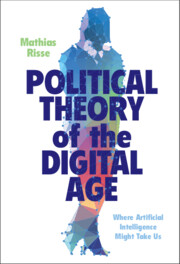66 results
1 - Introduction
-
- Book:
- Political Theory of the Digital Age
- Published online:
- 02 February 2023
- Print publication:
- 09 February 2023, pp 1-22
-
- Chapter
- Export citation
6 - Beyond Porn and Discreditation
-
- Book:
- Political Theory of the Digital Age
- Published online:
- 02 February 2023
- Print publication:
- 09 February 2023, pp 119-136
-
- Chapter
- Export citation
2 - Learning from the Amish
-
- Book:
- Political Theory of the Digital Age
- Published online:
- 02 February 2023
- Print publication:
- 09 February 2023, pp 23-46
-
- Chapter
- Export citation
Dedication
-
- Book:
- Political Theory of the Digital Age
- Published online:
- 02 February 2023
- Print publication:
- 09 February 2023, pp v-vi
-
- Chapter
- Export citation
7 - The Fourth Generation of Human Rights: Epistemic Rights in Life 2.0 and Life 3.0
-
- Book:
- Political Theory of the Digital Age
- Published online:
- 02 February 2023
- Print publication:
- 09 February 2023, pp 137-159
-
- Chapter
- Export citation
3 - Artificial Intelligence and the Past, Present, and Future of Democracy
-
- Book:
- Political Theory of the Digital Age
- Published online:
- 02 February 2023
- Print publication:
- 09 February 2023, pp 47-72
-
- Chapter
- Export citation
Acknowledgments
-
- Book:
- Political Theory of the Digital Age
- Published online:
- 02 February 2023
- Print publication:
- 09 February 2023, pp xxv-xxvi
-
- Chapter
- Export citation
11 - Moral Status and Political Membership: Toward a Political Theory for Life 3.0
-
- Book:
- Political Theory of the Digital Age
- Published online:
- 02 February 2023
- Print publication:
- 09 February 2023, pp 231-254
-
- Chapter
- Export citation
4 - Truth Will Not Set You Free: Is There a Right to It Anyway?
-
- Book:
- Political Theory of the Digital Age
- Published online:
- 02 February 2023
- Print publication:
- 09 February 2023, pp 73-95
-
- Chapter
- Export citation
Index
-
- Book:
- Political Theory of the Digital Age
- Published online:
- 02 February 2023
- Print publication:
- 09 February 2023, pp 291-304
-
- Chapter
- Export citation
Epilogue
-
- Book:
- Political Theory of the Digital Age
- Published online:
- 02 February 2023
- Print publication:
- 09 February 2023, pp 255-258
-
- Chapter
- Export citation
Contents
-
- Book:
- Political Theory of the Digital Age
- Published online:
- 02 February 2023
- Print publication:
- 09 February 2023, pp vii-viii
-
- Chapter
- Export citation
Bibliography
-
- Book:
- Political Theory of the Digital Age
- Published online:
- 02 February 2023
- Print publication:
- 09 February 2023, pp 259-290
-
- Chapter
- Export citation
Preface
-
- Book:
- Political Theory of the Digital Age
- Published online:
- 02 February 2023
- Print publication:
- 09 February 2023, pp ix-xxiv
-
- Chapter
- Export citation
5 - Knowing and Being Known
-
- Book:
- Political Theory of the Digital Age
- Published online:
- 02 February 2023
- Print publication:
- 09 February 2023, pp 96-118
-
- Chapter
- Export citation
8 - On Surveillance Capitalism, Instrumentarian Power, and Social Physics
-
- Book:
- Political Theory of the Digital Age
- Published online:
- 02 February 2023
- Print publication:
- 09 February 2023, pp 160-182
-
- Chapter
- Export citation
Copyright page
-
- Book:
- Political Theory of the Digital Age
- Published online:
- 02 February 2023
- Print publication:
- 09 February 2023, pp iv-iv
-
- Chapter
- Export citation
10 - God, Golem, and Gadget Worshippers: Meaning of Life in the Digital Age
-
- Book:
- Political Theory of the Digital Age
- Published online:
- 02 February 2023
- Print publication:
- 09 February 2023, pp 207-230
-
- Chapter
- Export citation
9 - Data as Social Facts: Distributive Justice Meets Big Data
-
- Book:
- Political Theory of the Digital Age
- Published online:
- 02 February 2023
- Print publication:
- 09 February 2023, pp 183-206
-
- Chapter
- Export citation

Political Theory of the Digital Age
- Where Artificial Intelligence Might Take Us
-
- Published online:
- 02 February 2023
- Print publication:
- 09 February 2023



